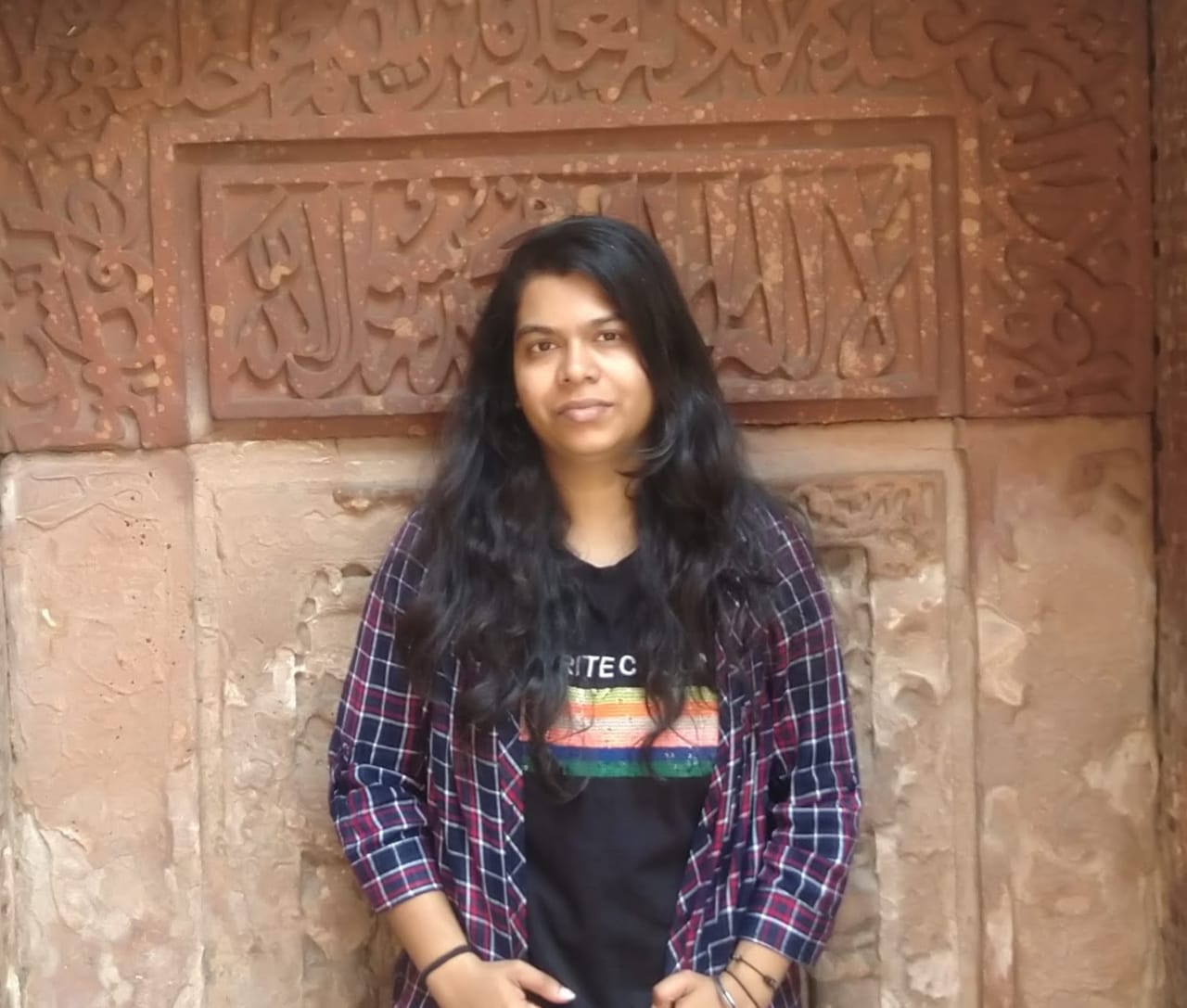When "Journalist" Barkha Dutt ended up helping Pakistan in the Kargil War
Even the then Army chief, General Malik, who led the army in 1999 during the Kargil war, had specifically quoted in his book how Barkha Dutt had revealed classified information during her live coverage. He also pointed out how her reporting was threatening to hurt the secrecy of the operations.
Total Views |
Every reporter during their academic years have read about the 'Basic Journalism Ethics,' which teaches how a moral media person should report. It also helps journalists in collecting and disseminating news by ensuring objectivity and fairness in reporting information to society. Similarly, in a war-like situation, the role of 'Journalism Ethics' becomes more prominent and critical otherwise, the reporter may end up leaking sensitive information about the country that can prove fatal to national security as "journalist" Barkha Dutt did during the Kargil war.
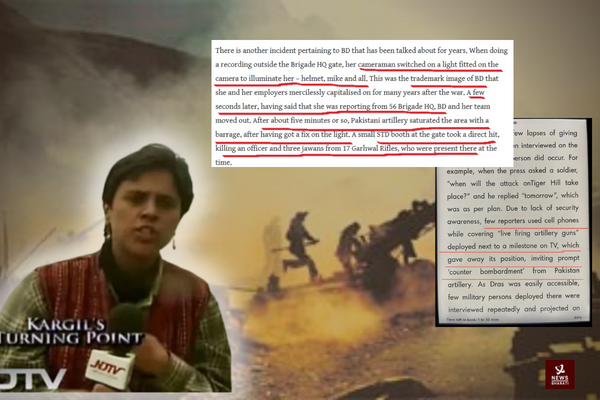
No one can forget how her dubious Kargil coverage spooked the army during the Kargil war, from providing crucial information about the secret operation to reviling military locations. Let us get into it in detail-
The Kargil War was fought between the Indian Army and the Pakistan Army in the Kargil region between May and July 1999. Since the war took place at a time when India's electronic media was just getting started, the media began providing more detailed media coverage of the Kargil war. Media outlets, like NDTV, and Star News channels had even started telecasting war footage live on TV to gain more TRP. Soon, the conflict became the first "live" war in South Asia even Major General Ashok Mehta also called it, "India’s first war on television."
Barkha Dutt was one of the journalists who was covering the "live war' for NDTV. She gained prominence for irresponsibly doing a live commentary during the "secret" Tiger Hill operation. While covering the operation, Barkha Dutt gave away the military location by concluding her live commentary by saying "Barkha Dutt reporting from 56 Brigade HQ" at the end.
She didn’t even blink or hesitate for a second before giving such a crucial bit of information on national television that too, live. It seemed that she was not reporting to inform the citizens but was acting like 'Vibhishan' by helping Pakistan by providing crucial information about the operations and live army movements.
Despite knowing that even army officers do not use satellite phones in conflict zones, as it allows enemies to track their movements, she carried one while doing live coverage of the war zone. One should remember that she was the only journalist to do so.
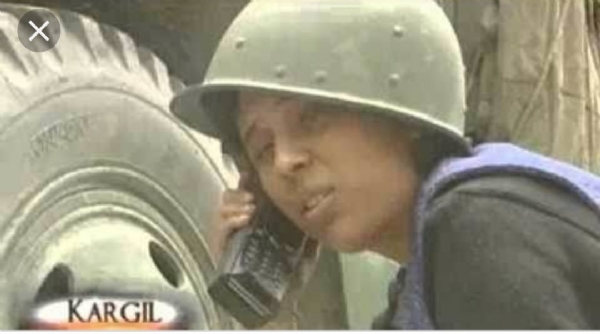
Even the then Army chief, General Malik, who led the army in 1999 during the Kargil war, had specifically quoted in his book how Barkha Dutt had revealed classified information during her live coverage. He also pointed out how her reporting was threatening to hurt the secrecy of the operations.
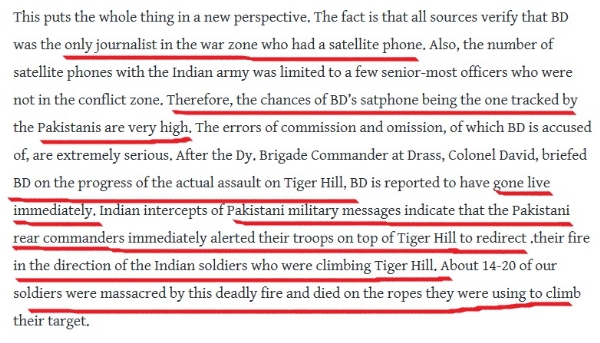
In a veiled statement, without directly taking the name of Barkha Dutt in his book 'MASHKOH: KARGIL AS I SAW IT', Brigadier Umesh Singh Bawa’s who commanded the 17 Jat during the Kargil war in 1999 also pointed out how few reporters gave away the Indian army's position to Pakistan and invited prompted 'counter bombardment by sending live reports via cell phone.
Besides Army chief General Malik, Lt Gen Mohinder Puri in his book ‘Kargil: Turning the Tide‘ said that the army might have got unnerved because of journalist Barkha Dutt's irresponsible journalism.
It reads, "At about 2120 hours, the exchange operator gave a ring in the ops room asking for me. The Corps Commander wanted to speak to me urgently. When the call got connected, all in the ops room could make out that something serious was being discussed between us. On finishing, I looked at Col SVE David, Deputy Cdr of 56 Mtn Bde, who was also present, and asked him to find out if Barkha Dutt of NDTV, then Star Plus/News Channel, was anywhere in the vicinity or amongst the media witnessing the artillery fire on Tiger Hill.
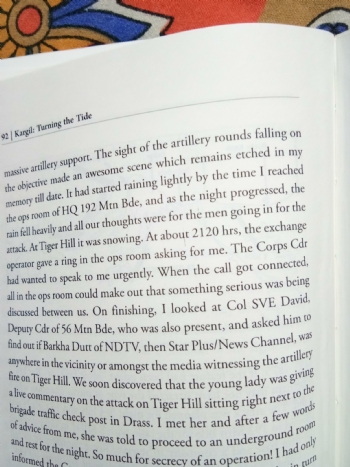
We soon discovered that the young lady was giving a live commentary on the attack on Tiger Hill sitting right next to the brigade traffic check post in Drass. I met her and after a few words of advice from me, she was told to proceed to an underground room and rest for the night. So much for the secrecy of an operation! I had only informed the Corps Cdr of the date of the operation and he in turn for reasons of secrecy had not even informed the Army Cdr. Hence the surprise and concern over Barkha’s reporting."
It was so disturbing to see a prominent journalist like her from a well-known media house, under the name of 'War Journalism', broadcasted some sensitive information that would have caused major casualties to the country. She should have once studied 'Journalism ethics', before doing 'war journalism'.
Since that blunder, everyone felt that Kargil's experience would have made the so-called journalist mature about these aspects, however, she again dug her own grave by repeating the same mistake during the Mumbai 26/11 terror attack. While reporting the attack, in one report, she unethically reported that "her sources are on the 19th floor, where the terrorists are currently in their murderous frenzy."
During an interview, she accepted the media's role in endangering the lives of civilians as well as security personnel by not restraining themselves during the telecast. Barkha admits that perhaps in hindsight, journalists made mistakes during the Mumbai siege. However, she then again tries to cover up the issue, saying that the media wasn’t aware that the handlers of the terrorists were monitoring news channels.
She said, "The Oberoi story, I do remember having said at some point… not the exact number, but when there was confusion over the fact that the hotel has been cleared, I did say that no, we still have reasons to believe that there are people who are trapped as hostages. That I did say. I don’t believe I was the only one who said it. Journalists across the board said that."
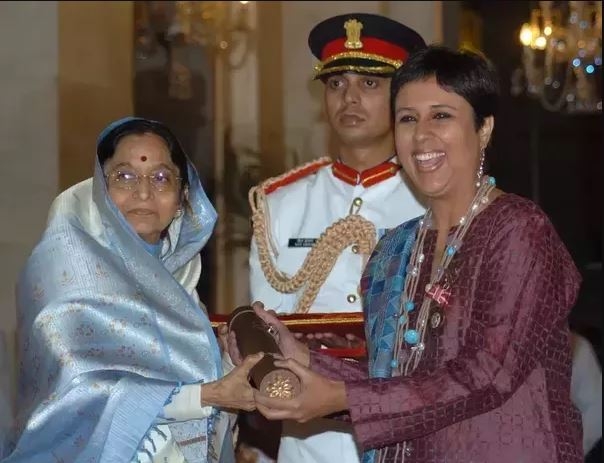
Interestingly, the Supreme Court too agreed that the media’s role during 26/11 was irresponsible and dangerous. It had pulled the media for its role in compounding the severity of the attacks by dedicating an entire section to it. Even after such a blunder, that times government of India didn't even take cognizance of the matter. What's more ironic is that a few months after the 26/11 blunder, the Sonia Gandhi-led Manmohan Singh government bestowed the Padma Award 2009 on "Dutt" for her reporting style.
Such blunders by the journalist need to be said so that the aspiring journalist do not repeat such grave mistakes
